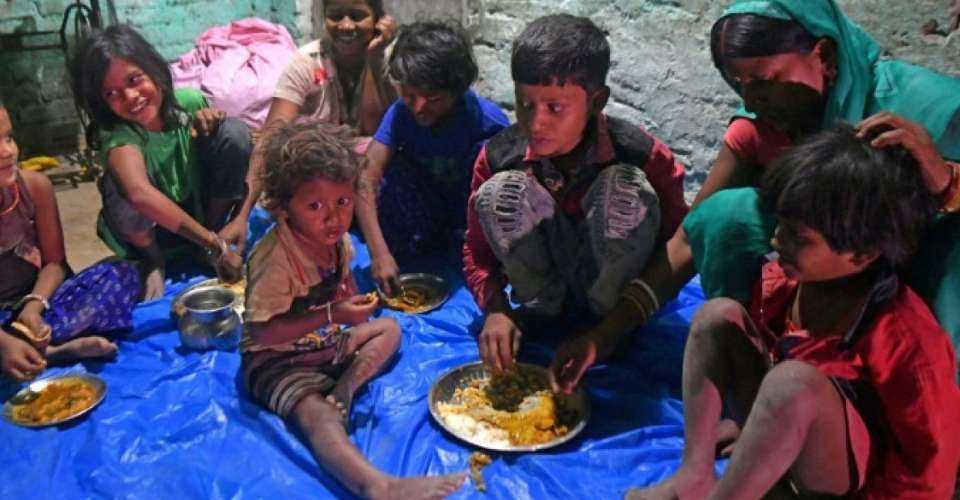
Jaimala Devi, mother-of-seven, feeds her children in her village house in northern India's Bihar state. The state, along with neighboring Uttar Pradesh, is among the poorest Indian states in terms of education, healthcare facilities, and other human development indices. (Photo: AFP)
The Indian government has stopped Agra Catholic archdiocese from accepting foreign funding, which Catholic leaders say threatens to cripple Church’s social service activities in 12 dioceses in the northern region.
The federal government, run by the pro-Hindu Bharatiya Janata Party (BJP) has revoked the Foreign Contribution Regulation Act (FCRA) registration of the Agra Catholic archdiocese, based in northern Uttar Pradesh state.
“The federal government has indeed canceled our FCRA registration,” Archbishop Raphy Manjaly of Agra confirmed to UCA News on June 28.
The FCRA registration is necessary for any voluntary organization to receive foreign funds in India.
The regional Catholic charity of the Agra archdiocese, Uttar Kshetriya Samaj Vikas Kendra, funds social developmental projects in 12 dioceses under the archdiocese, which is considered the mother diocese in northern India.
The government action “has badly affected our social and other developmental works among the people living in the 12 dioceses in the region,” the archbishop said.
Established in 1886, the Agra diocese is the first Catholic diocese in northern India. It covered a vast area then, including parts of present-day Pakistan and Tibet.
The territories of the archdiocese and the 11 dioceses under it are within Uttar Pradesh state, known as one of the poorest Indian states in terms of education, healthcare facilities, and other human development indices.
An official working with the charitable arm said the Church charities are primarily engaged in social welfare programs with women's self-help groups, as well as education and health care projects.
The license withdrawal “has brought our social work activities almost to a standstill as we have no money to pay the employees' salaries.”
He said the agency plans to move an appeal before the federal government to reconsider its decision because we have not violated the government norms. We wonder why such a harsh punishment,” the official told UCA News on June 28.
“We work among the poor and the oppressed, aiming for their welfare. The details of our work are available in the public domain,” the official said.
Christians targeted
This is not the first time a Christian NGO has faced the wrath of the government of Prime Minister Narendra Modi, which is accused of following a Hindu-first policy ever since it came to power for the first time in 2014.
Since then, the government has canceled the FCRA licenses of 20,702 outfits. According to official data, the country currently has 16,122 active NGOs permitted to receive foreign funds.
Critics say the government smothers non-government agencies that are critical of the government.
Modi’s opponents also say his government targets Christian agencies as part of a pro-Hindu policy that wants to stop missionary work in India to help establish the nation of Hindu hegemony.
Modi was sworn in as prime minister for a third term on July 9. This time, the 73-year-old pro-Hindu party leader has cobbled together a coalition government due to a reduced majority in the Lok Sabha (lower house of parliament).
In January this year, the government banned World Vision India, one of the country's largest Christian organizations, from accepting foreign funds.
Its humanitarian services benefited nearly 3 million children and their families in 22 states. Its license was canceled, allegedly without giving any valid reasons.
In February last year, the Modi government canceled the license of the Trivandrum Archdiocese (now Thiruvananthapuram) in southern India.
The archdiocese in the coastal region in southern Kerala state came under the ire of the Modi government after its bishops and priests joined a 140-day stir against a seaport project operated by a businessman close to Modi in its jurisdiction.
In April, fringe elements in Modi’s party sought a probe into the activities of Caritas India, the social arm of the Catholic Bishops' Conference of India (CBCI), saying the charity threatens India's national, social, and economic security.


